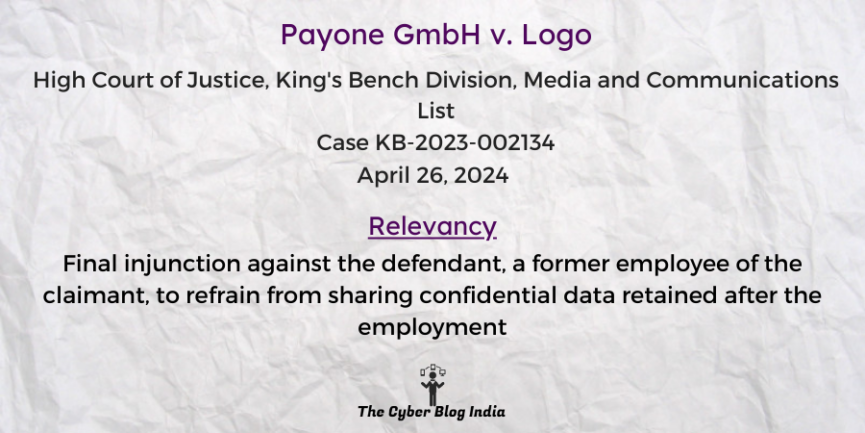Payone GmbH v. Logo

Payone GmbH v. Logo
[2024] EWHC 981 (KB)
In the High Court of Justice, King’s Bench Division, Media and Communications List
Case KB-2023-002134
Before Justice Saini
Decided on April 26, 2024
Relevancy of the case: Final injunction against the defendant, a former employee of the claimant, to refrain from sharing confidential data retained after the employment
Relevant Facts of the Case
- The claimant is a payment service provider that provides risk management services and is based in Germany. The claimant employed the defendant, who is based in the UK. The defendant carried out anti-money laundering and KYC verifications while onboarding new clients. The defendant took sick leave and resigned from the company during his leave.
- The claimant accused him of misappropriating financial records, company records, and confidential client information that he retained after his employment was terminated. The claimant brought this notice to the Information Commissioner’s Office.
- The forensic investigations revealed that the defendant sent over 150 emails to himself from his work email account. The contents of the emails were not clear since the defendant double-deleted them. The employment tribunal proceedings found that the defendant took photographs of several confidential documents through his devices.
- The defendant returned a 58-page bundle of materials containing sensitive information that he retained to the Financial Conduct Authority and their German and Belgian counterparts.
- The claimant sought alternative dispute resolution to retrieve further company records and financial records. The defendant refused. In the proceedings, the court granted the claimant interim jurisdiction, leading to the defendant filing for an appeal.
- In the present case before the High Court, the claimant has sought a final injunction.
Prominent Arguments by the Counsels
- The claimant’s counsel submitted that his client seeks a final injunction. They seek to stop the defendant from sharing confidential information with any third-party person. He also asked for delivery of the misappropriated company records and other confidential information from the defendant.
- The defendant, appearing in person, argued that when he disclosed the records during the Employment Tribunal proceedings, they entered the public domain. The claimant could have asked to seal those documents during the proceedings. However, they did not. This “silence” means that the claimant did not consider these documents confidential.
- The claimant’s counsel countered that holding documents in open court does not harm confidentiality. The claimant believes in upholding the principle of open justice, and hence, it did not contest for sealing with the Employment Tribunal proceedings.
Opinion of the Bench
- The defendant’s arguments had no merits. The documents remain confidential and have not lost their confidence.
- The defendant should not be treated as a journalist. He should be treated as an employee found in breach of his employer’s trust.
Final Decision
- The court granted a final injunction to the claimant, refraining the defendant from further use of the documents.
- It also awarded costs to be paid by the defendant along with returning the documents to the claimant.
Aarya Tyagi, an undergraduate student at the Institute of Law, Nirma University, Ahemadabad, prepared this case summary during his internship with The Cyber Blog India in May/June 2024.
